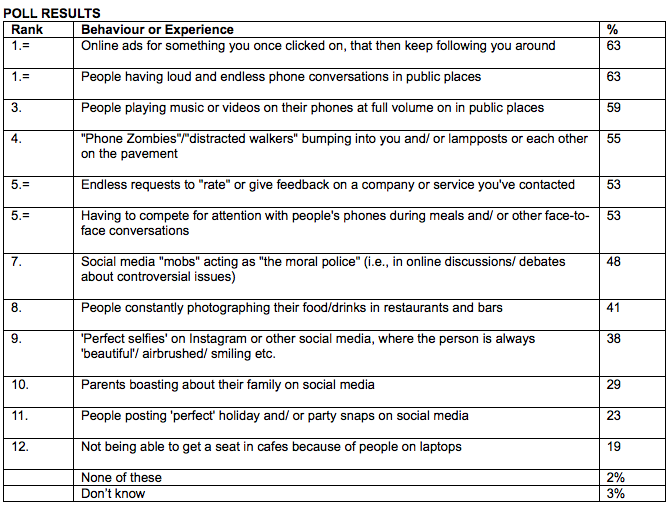The digital age is well and truly among us and the way people act and behave has changed dramatically in the last 20 years. We are beginning to suffer tech irritation and it’s one itch that we can’t seem to scratch.
Online ads that follow you around and people holding loud and long phone conversations in public places are the worst irritants of our modern digital age, according to a new international poll.
They topped a list of such digital aggravations, in an online survey of 5,029 Americans and Britons, conducted by pollsters YouGov on behalf of Living MacTavish, a business that connects people in the offline world by hosting salon-style gatherings of thought-leaders in San Francisco, New York and London.
People playing music or videos at full volume in public on their phones and “Phone Zombie” pedestrians bumping into you or each other on the pavement ranked third and fourth respectively.
Endless online requests for feedback or ratings and having to compete for attention with people’s phones during at mealtimes ranked joint fifth.
Susan MacTavish Best, the founder of Living Mactavish, said: “We’ve entered the age of digital overwhelm and tech fatigue. We’re tiring of the constant distraction and intrusion of technology in our relationships and daily lives. Offline is the new online.”
Poll respondents were shown a list of 12 behaviours or experiences common to our modern digital age and asked to pick the ones that they personally found annoying.
The two experiences that polled joint top, on the basis of each irking nearly two-thirds (63%) of respondents, were:
- Online ads for something you once clicked on, that then keep following you around
- People having loud and endless phone conversations in public places.
There is, says MacTavish Best, “a digital paradox” to our time. “The more digital that the world becomes, the more people are realising that all real relationships and business deals happen offline, in an analogue world.
“And it’s folks in their twenties and early thirties, the so-called digital natives, who are leading the charge back to the future and adopting the old analogue ways with most gusto.”
Four other options were found annoying by over half of all poll respondents:
- People playing music or videos on their phones at full volume on public places (59%)
- Phone Zombies – alias “distracted walkers” – bumping into you and/or each other on the pavement (55%)
- Having to compete for attention with people’s phones during meals and/ or other face-to-face conversations (53%)
- Endless requests to “rate” or give feedback on companies or services you’ve contacted. (53%)
The single most irksome thing for those 55+ was “People having loud and endless phone conversations in public places”.
What, by contrast, annoyed the largest percentage of those 18-24, were “Online ads for something you once clicked on, that then keep following you”.
This is also what annoyed the largest percentage of both women and men in general, although more women (65%) than men (62%).
What the largest share of Americans (63%) found annoying were those loud and endless phone conversations in public places, while the largest share of Brits (65%) disliked the online ads that followed you around.
Other things that irked a major share of all respondents included:
- Social media “mobs” acting as “the moral police” (i.e., in online discussions/ debates about controversial issues). (48%)
- People constantly photographing their food/drinks in restaurants and bars. (41%)
- ‘Perfect selfies’ on Instagram or other social media, where the person is always ‘beautiful’/ airbrushed/ smiling. (38%).
The survey results can be seen more clearly here (Figure one), the results came from the question: “The following behaviours and/ or experiences seem like common features of the modern digital age…Which, if any, of the following, do you personally find annoying?”
















